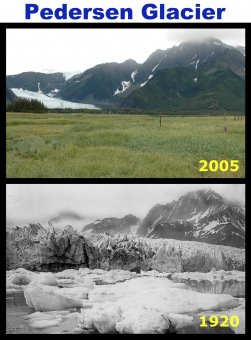Definition of climate change and global warming
 |
| Figure A |
The terms "global warming" and "climate change" are often used interchangeably in newspapers and television reporting, but they are really separate things. Global warming refers to the rise in global average temperature. Climate change is how the climate of different areas around the globe change over time, mostly due to this global average temperature increase and the changes that result to the water cycle, ice cover on land and in the polar oceans, and changes in land cover. Climate change can also occur naturally due to changes in sunlight, the growth of mountains, and the movement of the continents across the earth over time.
Global warming only describes the increase in global average temperature. The current global average temperature is 59°F (15°C, 288K) and is projected to increase 3-7°F (2-4°C, K) by 2100. It is generally agreed upon that the man-made increase in greenhouse gases due to the burning of fossil fuels is causing or expediting this warming. The rise in global average temperature doesn’t mean the temperature will increase by the same amount everywhere. It doesn’t even mean that everywhere in the world will get warmer. It just means that the average global temperature is increasing. This is where climate change comes in.


|
What is climate change? Incompatibility between the definitions used by science and policy organizations is an obstacle to effective action.: An article from: Issues in Science and Technology Book (Thomson Gale) |